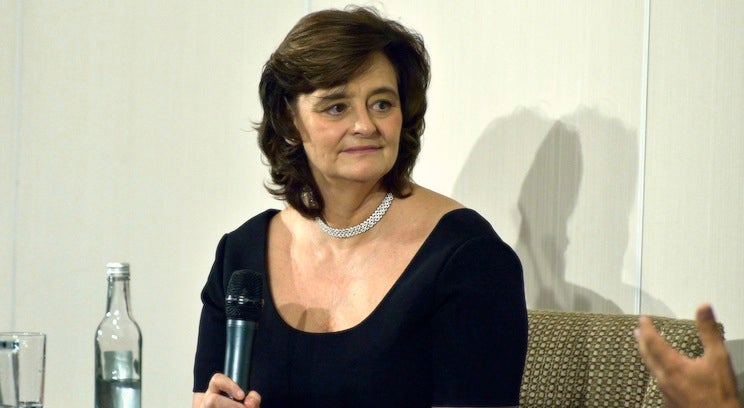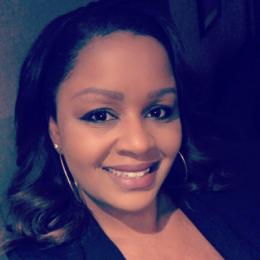
Cherie Blair, founder and chair of Omnia Strategy, LLP, is a top barrister with more than 35 years in practice who specializes in public international law, human rights, employment law, arbitration and mediation. In today's global business climate, general counsel and chief legal officers are tasked with protecting, advising and leading their companies in matters of business as well as law.
To address these needs, ACC held the ACC General Counsel Summit in London this past September. Given her expansive background, Blair was uniquely qualified to address the chief legal officers, general counsel and law department leaders in attendance, and she gave a keynote speech on today's general counsel and how they can best serve modern business.
Before the summit, Blair was gracious enough to speak with ACC about her career, the current state of the legal profession and the women working within it and in the business arena as whole — and offered advice for those entering the field.
Background and legal career
ACC: CBE (Commander of the Most Excellent Order of the British Empire), founder and chair of Omnia Strategy, Queen's Counsel (QC) and founder of the Cherie Blair Foundation for Women: Please tell us a little about your background that led you to wear so many distinguished hats.
Cherie Blair: I have certainly come a long way from growing up in Liverpool in a single parent family. I was brought up by my mother and my grandmother, and their influence has been enormously positive. I feel that there are very strong links from my early childhood right through to my career today.
I was an avid student and I was always keen to get involved with current affairs from an early age. In the end, it was law and not public service that I pursued. I certainly don't regret that turn of events, not least because I was able to advocate causes that I believed in through my legal work,like equality, women's rights and freedom of religion. I have had the privilege of supporting these principles, amongst others, before not just the highest courts in England and Wales, but also before the European Court of Justice, as well as working as a recorder and arbitrator.
My latest career change has been to establish Omnia Strategy. My role within the firm allows me to work on the issues that I am passionate about, like dispute resolution and human rights — albeit bringing a new angle to the provision of legal services.
Omnia Strategy is a new kind of law firm offering not just pure legal services, but also expertise in policy, diplomacy and strategic communications.
More women barristers
ACC: We have observed a trend toward more women in GC positions within legal departments. Have you observed an increase in the number of women entering the legal profession, and if so, to what do you attribute this trend?
Cherie Blair: I was lucky to come into the legal profession in the 1970s in Western Europe at a point when there was a step change in relation to the position of women in the law. All of a sudden it was possible for women to hold positions in law firms, as barristers, or in companies as general counsel.
When I started in the legal profession, only 10 percent of the lawyers were women. However, my daughter has just become a tenant as we call it, in a barrister's chambers here in London, and in her law class at least 50 percent of the entrants were women.
There's been a huge influx of women into the legal profession, which obviously is very positive. In fact, the Law Society statistics show that 48.2 percent of solicitors today are women and this figure is expected to reach 50 percent in 2017.
It's a cause to celebrate, the fact that women have come into the legal profession and they're not faced, as I was, with comments like "Women can't be trial advocates because their voices don't carry far," or "We don't take women in our legal practice because the clients don't like it," or "We do take women, but we've got one — so we wouldn't want two." That attitude no longer exists. What you do find, however, like in many other professions and businesses in general, is the glass ceiling effect. So nearly 50 percent of solicitors in England and Wales are women, but when you look at the gender mix at the partner level, while 43.3 percent of male solicitors become partners, the figure for women is only 19.2 percent.
At the Bar, the QC divide is worse: In 2014 there were 1,404 self-employed male QCs, but only 215 female QCs (fallen from 248 in 2011).
I believe that one consequence of this disparity at the senior levels in private practice is that women are looking for more congenial places to work, where their talent is recognized and the environment is sustainable, with flexible working, support and mentoring. More often than not, the private sector is ahead of the curve on these matters, which might be why women are gravitating toward roles in private companies and corporations, and are attracted to roles such as general counsel.
Wage inequality
ACC: While more women are present and leaders within the business arena, there are still reports of wage inequality and perceived limited opportunities for growth and promotion due to family obligations, etc. What are your thoughts on this and what can women (and their male counterparts) do to combat inequality in the workplace?
Cherie Blair: We have similar issues — women in law firms tend to earn less than men overall, and that's including women partners. And it's not just a problem for the legal profession — it's a problem for many other professions and businesses as well. This in- equality is driven by a combination of factors. One is of course retention — of the solicitors aged under 35, 60 percent are women. But if you look above 35, only 40 percent are women. This is telling us that there's something in the working practices of law firms that is deterring women.
The legal profession likes to see high flyers developing in their 30s, and that's often the time where women are also thinking about their biological clock. And often, when they return from maternity leave, women find themselves put on a slower track than the men. There are a number of things we can do to change that. First of all, in relation to wages, transparency is very important. Transparency means that people can actually see how much they really are valued. That's something that we now require in Britain. The government has just brought forward a proposal, which in fact was proposed by the previous Labour government in 2010, to ensure that large companies — which would include some of the large law firms — do in fact declare their policies and the income position of their employees.
Further action is needed to stem this loss of female talent. Clearly a commitment by firms to flexible working and a clear signal from management that those who work part time are not to be regarded as somehow uncommitted. Role models, mentoring, female networking, parental leave, fair work–life/ family balance — all of these things can make a difference.
The Cherie Blair Foundation for Women
ACC: Did any of your own experiences as a woman working in law inspire the focus of your foundation, the Cherie Blair Foundation for Women?
Cherie Blair: In 2008 I wanted to do something for women in the developing and emerging markets — I believe that a woman should have control over her own money and have the power to make choices. Therefore I wanted to do something to help women entrepreneurs. So I set up the foundation, which helps women build up their capital, their capacity in the sense of business and financial literacy training, and also their confidence.
Economic opportunity is an important driver of lasting cultural and societal change. Enable a woman to start her own business and you empower her to lead an independent life and support a family on her own terms.
Studies have shown that when you empower a woman, you empower an economy, and indeed a nation.
This is because women invest 90 percent of their income back into their families and communities, which benefits both their immediate society and the wider economy.
The General Counsel Summit
ACC: At the ACC General Counsel Summit held in September, your keynote address focused on how today's general counsel can best serve modern business. What are the top two or three things a commercial lawyer must know or do to be successful today?
Cherie Blair: I think the key to any business, law firm or corporation of any kind is innovation. You have to be innovative in today's fast changing world.
Law firms, especially when they're working with companies, need to innovate. The lawyer needs to be the person who assists them to do that, rather than the person who always tells them what they can't do. Just as the GC is now an integral business advisor in the company, if the commercial lawyer is to offer value, they need to develop the skills to cater to this broader role.
I think commercial lawyers have a lot to learn from the business-oriented role and policy-orientated role of the general counsel if they too are to offer flexible, innovative advice to their clients.
All lawyers must appreciate the legal and non-legal elements to their company (or clients) and understand that these areas often overlap. To achieve this, they must develop a broader strategic understanding of their company (or clients).
Keeping an open mind also helps lawyers, including GCs, to anticipate problems they may face and to devise creative solutions. Not only solving legal problems, but also helping to position a business to achieve its strategic aims should be the goal of the commercial lawyer.
Legal and the business
ACC: How can general counsel ensure that their legal teams (both inside and outside counsel) better manage the risks of a global business environment?
Cherie Blair: Today, businesses want to be good global citizens and there's a demand from investors, employees and communities for businesses to act positively and to have a beneficial social impact.
Consequently, lawyers have to be very aware of this trend and also aware of the risks and triggers that can lead to reputational harm and worse.
GCs must be alive to issues including sustainability and corporate social responsibility. This means considering not just black-letter law, but thinking strategically.
The Evolution of the legal profession
ACC: ACC research found that the GC role has evolved to include more of a strategic business focus, and today's GC fulfills three roles — leader of the legal department, counselor in chief and business strategist. More broadly, how have you seen the legal profession evolve during your time as a barrister?
Cherie Blair: Gone are the days of lawyers inhabiting ivory towers from which lofty opinions were delivered to clients priced according to handsome hourly rates.
Lawyers should now be expected to deliver advice, which is succinct, clear and practical. This is a change for the better. Value is no longer measured by the weight of legal documents but by whether the advice makes a real difference to the recipient. This might also mean giving consideration to matters that are not strictly legal.
I established Omnia Strategy as a response to this new environment. Our multi-disciplinary and strategic approach is intended to deliver the kind of help that a modern business, individual or government requires in a complex world.
Advice for your 20-year-old self
ACC: Many of us wish we could have a conversation with our younger selves, especially when it comes to our careers. If given the chance, what advice would you offer your 20-something self?
Cherie Blair: Be prepared for change and be willing to adapt. As lawyers, we need to be flexible; we need to be imaginative. We can't always expect that things are going to stay the same indefinitely. Back when I started practicing in the '70s, I could never have predicted where the law would take me or how just how far many areas of the law have expanded.
Getting to know... Cherie Blair
What piece of advice or lesson learned during law school do you still follow today?
The law can be extremely technical and at times you can feel as if it loses touch with reality. Legal theory is important, but I have always prided myself on being a practical lawyer delivering advice that clients can understand and act upon.
What is your proudest achievement to date?
I have to say my children. This is not a backward statement or one that flies in the face of modern feminism. I am proud of having raised such wonderful children while pursuing my own career — in the glare of the media spotlight.
When you're not running a firm and a foundation, what do you like to do in your free time?
Time off is a rare commodity. Given the amount that Tony [former British Prime Minister Tony Blair] and I travel, and the fact that the children are busy pursuing their own lives, I enjoy the simple pleasure of being with my family.
If you could travel anywhere in the world, where would you go and why?
So many places come to mind but really nowhere beats the calm and beauty of the Buckinghamshire (English) countryside.




